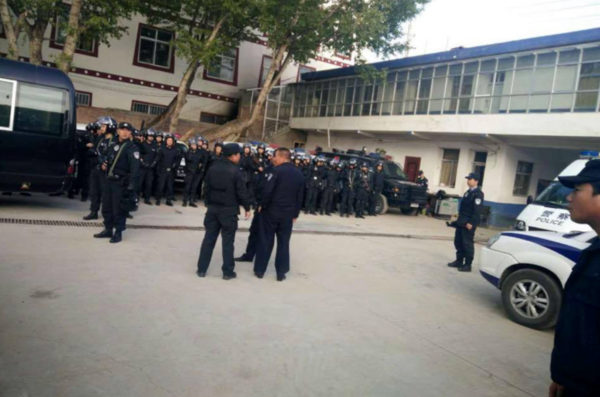
Armed Chinese police in Amchok on Thursday, June 2.
Following days of peaceful protests (see previous ICT report: Demonstrations continue in Amchok), armed Chinese police beat and detained a number of Tibetan demonstrators in the Amchok region of northern Tibet. The protests, which centered on stopping open-pit mining at Gong-Ngon Lari mountain, were stopped following the release of a circular written by the township government claiming that the protests were instigated by “evil people.” Amchok township remains in a state of tight control by Chinese security forces.
Shops and restaurants were closed in Amchok, in Sangchu (Chinese: Xiahe) county, Kanlho (Chinese: Gannan) Tibetan Autonomous Prefecture in Gansu province (in the Tibetan area of Amdo), on Friday June 3, as six Tibetan protest leaders were severely beaten and subsequently hospitalized. The violence appears to have been sanctioned by the township government, which warned in a circular notification that protestors would have to “take full responsibility” for the consequences of their demonstration. The circular, which was translated by the Tibetan Center for Human Rights and Democracy (TCHRD), blames the protests on “anti-China” forces:
Recently under the instigation of a few evil and corrupt people, a group of masses have illegally gathered to ostensibly protest against what they refer to as destruction of environment. Their protests have hindered gold mining at Nag Deu mine. They have also, in collusion with anti-China forces, indulged in lies and propaganda. These incidents have caused negative influence and serious consequences.
Amchok has seen 15 years of tensions between local Tibetans, who view Gong-Ngon Lari as a holy mountain, and authorities attempting to operate a gold mine. Two Tibetans (Tsering Dhondup, age 35, and Kunchok Tsering, age 18) set fire to themselves and died near the entrance to the gold mine in November 2012. According to TCHRD, “Tsering wanted to highlight the hardship and suffering of the local Tibetans harmed by mining activities.”
Protests against mining and to protect Tibet’s fragile high-altitude environment have become increasingly frequent, and dangerous, as the Chinese authorities accelerate large-scale mining in copper, gold, silver, chromium and lithium. Tibetans who express concern about the impact of toxic waste, deforestation, and large-scale erosion risk being imprisoned, tortured, or killed.

